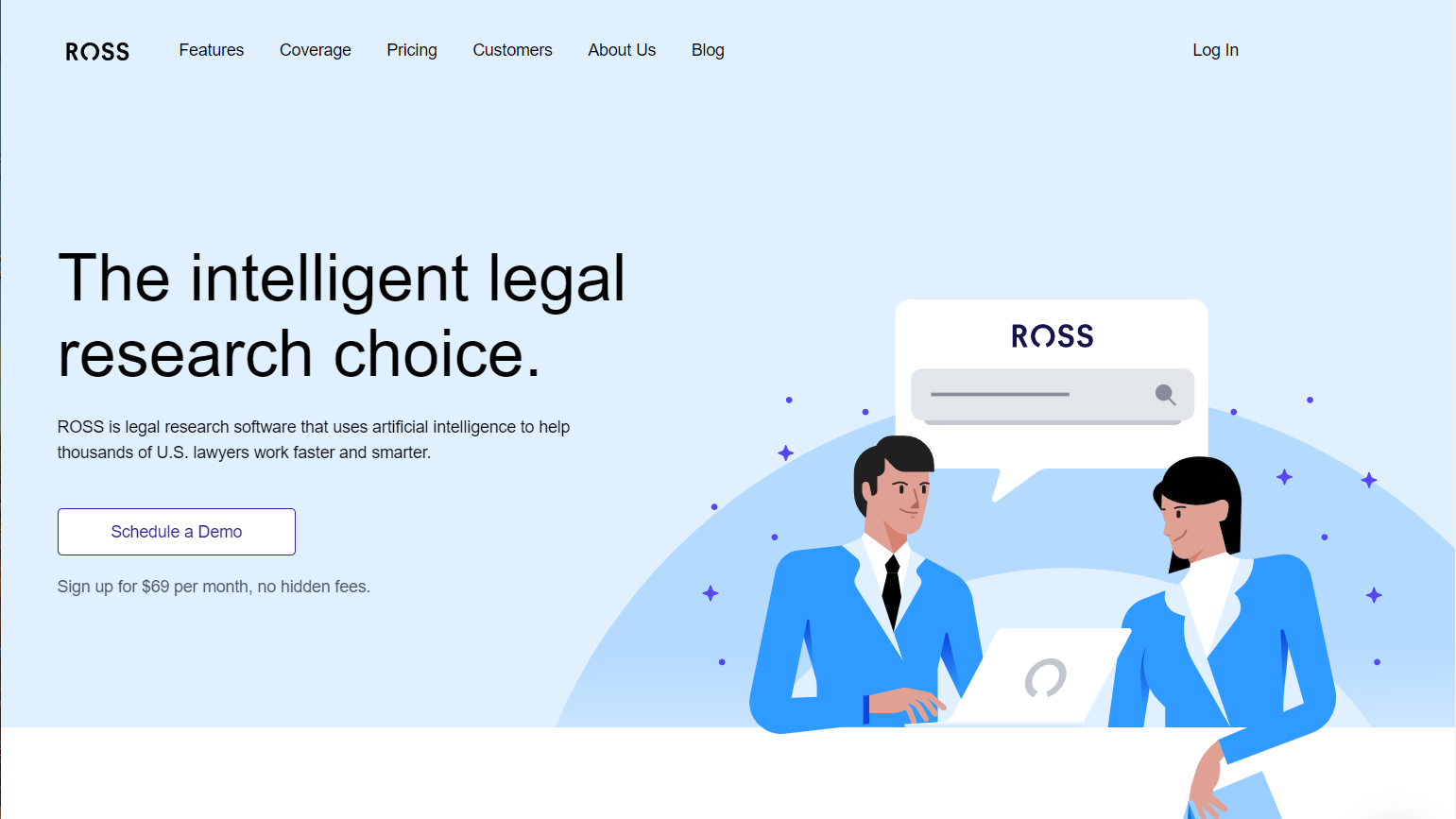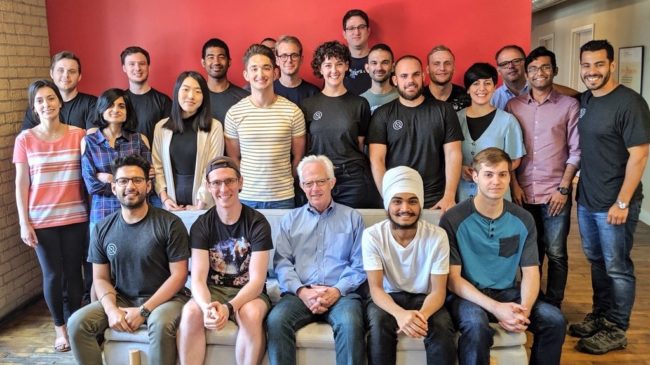ROSS Intelligence, a company that sought to innovate legal research through the use of artificial intelligence, and that helped to raise awareness of AI throughout the legal industry, is shutting down its operations, as a lawsuit against it by Thomson Reuters has crippled its ability to raise new financing or explore potential acquisition and left it without sufficient funds to operate.
“We have made the difficult decision to shut down operations at ROSS Intelligence,” the company said in a statement issued this morning (the full text of which is printed below). “As of Monday of this week, we have no longer been accepting new customers. As of January 31, 2021, the ROSS platform will no longer be available. Between now and then, our priority is to help our current customers transition to other services.”
Even as it ceases operations, however, the company vows to continue its legal battle, using insurance funds to pay its litigation costs.
“The company will continue as a going concern so that the facts at the heart of this lawsuit are brought to light and so that Westlaw’s tactics — using litigation as a weapon and stifling competition — do not succeed,” the statement said.
TR Alleges Copyright Infringement
Thomson Reuters sued ROSS in May, alleging that it stole content from Westlaw to build its own competing legal research product. ROSS did this, TR alleged, by “intentionally and knowingly” inducing the legal research and writing company LegalEase Solutions to use its Westlaw account to deliver Westlaw data to ROSS en masse.
“ROSS did so, not for the purposes of legal research, but to rush out a competing product without having to spend the resources, creative energy, and time to create it itself,” TR’s complaint alleged.
Within a day of the lawsuit, ROSS responded with a vigorous denial of the allegations. Cofounders Andrew Arruda, CEO, and Jimoh Ovbiagele, CTO, asserted that TR’s lawsuit was nothing more than an anticompetitive tactic by TR to squelch an up-and-coming competitor.
“By filing this lawsuit despite its lack of merit, Westlaw is interfering with our chances of securing more funding or merging with other companies, which we need to do in order to innovate and compete with Westlaw,” they said at the time. “This is not the first time Westlaw has used litigation as a weapon.”
Lawsuit Thwarted Growth
Those words turned out to be prescient, as the lawsuit prevented ROSS from raising new financing or being acquired.
“[J]ust as Westlaw devised it to be, this ongoing suit has been heavy for ROSS to bear,” today’s statement said. “Litigation is expensive — no matter how speculative the claims against you nor how worthy your position.
“With our company ensnared by this legal battle, we have been unable to raise another round of funding to fuel our development and marketing efforts. Our bank account is running out, and we must cease operations in the New Year.”
For its customers, ROSS has made arrangements for them to transfer their accounts to one of three other legal research platforms: Fastcase, vLex or Casetext. Customers will also be able to export their personal data, including all data from their saved folders.
ROSS’s staff will be let go.
ROSS Will Continue In Court
Even as TR’s lawsuit forces it to shut down, ROSS says it will continue to fight on in court.
“We’re fighting for not just ROSS, but for every legal tech startup that exists today and which may exist in the future,” Arruda told me in an email. “We’re fighting for every customer we’ve ever had, every law student, paralegal, researcher, reporter, self-represented litigant, and lawyer.
“Ultimately, our fight is to ensure the legal technology field is fair and competitive so that every person who is subject to the law can access the law.”
In July, ROSS filed a motion to dismiss the lawsuit, in which it denied that it copied or used any proprietary data from Westlaw, and contended that TR’s complaint failed to allege any facts to the contrary. Its motion also questioned TR’s claims of copyright in case headnotes and its key number system, arguing that neither has the requisite originality or creativity required to be protected by copyright.
At a hearing on that motion last month, Delaware U.S. District Chief Judge Leonard P. Stark appeared to question the factual foundation of TR’s lawsuit.
“Why shouldn’t I understand what you are telling me to be, hey, we’re just completely speculating here that the defendant actually used some of our protected material,” Judge Stark asked TR’s attorney. “We really don’t know, we just suspect they could not have developed their product so quickly if they didn’t. But, you know, let us get to discovery and then we’ll find out if our suspicions are correct.”
TR’s attorney responded that it was a “plausible inference” that ROSS copied and used TR’s copyrighted content, based on the circumstances alleged in TR’s complaint.
Founded in 2014
ROSS began in 2014 at the University of Toronto as a student-built entrant in a cognitive-computing competition staged by IBM to develop applications for its Watson computer – then famous for having won Jeopardy!
ROSS’s prototype won the UT competition, earning them a write-up on the front page of The Globe and Mail – which touted ROSS as the future junior associate at Bay Street law firms – and serving as a springboard for the company’s rapid acceleration.
At the time, the oldest of the three founders, CEO Arruda, a University of Saskatchewan law graduate who was then articling at a Toronto law firm, was 25. The youngest, Ovbiagele, a computer scientist, was 21. The third, Pargles Dall’Oglio, also a computer scientist, was a bit younger than Arruda.
ROSS went on to compete in IBM’s national competition in 2015 as the only non-U.S. college team. Although it came in second, its momentum was already established, further fueled by a series of click-bait headlines touting ROSS as the robot lawyer of the future.
Soon, the founders were invited to Silicon Valley to participate in the prestigious Y-Combinator startup incubator. Denton’s NextLaw Labs made ROSS one of its earliest investments.
In 2015, ROSS secured $4.3 million in seed funding and then, two years later, another $8.7 million in Series A funding. In 2017, Forbes named the three founders to its “30 Under 30.”
At legal conferences, CEO Arruda was a ubiquitous presence, speaking on the future of AI in law, and the company seemed the poster child for that future.
‘Still Writing Our Legacy’
Although ROSS is ceasing operations, Arruda, in an email exchange last night, left open the possibility of its return.
“Once the litigation concludes, we hope to return to business as usual: innovating in the legal research space,” he said. “That might mean licensing the technology or using it in other applications, or it might mean building and iterating our platform as it exists today. But for the time being, we are focused on winning this litigation.”
I asked Arruda what he sees as the company’s legacy.
“We’re still writing our legacy,” he said. “We hope that this legal battle with Thomson Reuters and Westlaw sets a precedent that enables more competition in the legal research space, puts less of the law behind paywalls, and ushers in even more innovation — leading to better and less expensive services for lawyers and legal researchers everywhere. That’s been our vision from day one.”
I also asked what he sees as the company’s impact on the legal landscape and for what it will be remembered.
“Since its founding, ROSS has represented, I think, a new way of approaching legal research,” Arruda said. “We’ve also, I hope, been seen as advocates for legal technology being used to further access to justice.
“Whatever ROSS rises to be in the future, I think this first phase of its growth and the lawsuit that put its operations on pause will be remembered as the exposition and rising action of its narrative arc. We have yet to see the climax and resolution of this story — we’re writing it now.”
A Death Not for Naught?
As a legal technology blogger, I get great satisfaction from writing about the launches of companies seeking to innovate the practice of law and the delivery of legal services.
But I have to admit that it pains me to write about the deaths of companies. It hurts even more having gotten to personally know the founders and meet face-to-face with many of the company’s employees.
Last year, I visited ROSS’s Toronto research and development office, where I got to meet with many of the people who helped build and operate the company. After the visit, I wrote a lengthy post about what I saw and learned, as well as about the company’s history and its potential future. In that post, I said:
“There is no better way to get the pulse of a company than to move past its executives and marketers and meet with the people who actually design, build and service the product. Over the course of multiple conversations last week, one point became clear to me. Those on the ROSS team truly believe they have created a better legal research tool. And they are not satisfied with stopping there. They have a vision of a product that does not just deliver better results, but that will someday also help lawyers make better sense of those results.”
I also recorded two episodes of my LawNext podcast there, one with the two founders Arruda and Ovbiagele about the birth and development of the company, and another with Ovbiagele and Stergios Anastasiadis, head of engineering, on the AI technology that drive the platform.
When Thomson Reuters filed its lawsuit last May, I characterized it as a battle of Goliath v. David. It appears that Goliath has now won a major campaign. But it also appears that the war continues, as ROSS vows to fight on.
In extended litigation, no party ever comes out a clear winner. Litigation exacts many tolls, not all of them financial. But maybe this case, regardless of who “wins,” could lead to precedent that will guide future legal tech startups, and thereby benefit future legal tech consumers. If so, the death of ROSS will not be for naught.
Full Text of ROSS’s Statement
Here is the full text of the statement ROSS issued today:
Dear customers, friends, supporters,
We have made the difficult decision to shut down operations at ROSS Intelligence. As of Monday of this week, we have no longer been accepting new customers. As of January 31, 2021, the ROSS platform will no longer be available. Between now and then, our priority is to help our current customers transition to other services.
What happened
Six years ago, we set out to make legal services more accessible by innovating legal research. We felt then, as we do today, that legal research could be more efficient, less expensive, and more accessible.
Since then, we’ve created a product that legal researchers love. We’ve worked with amazing partners to make legal research tasks more efficient and delightful. At every turn, we’ve been grateful to receive lawyers’ and other legal researchers’ feedback to shape ROSS’s development. We’ve been honored to serve legal researchers in many contexts across the U.S.: lawyers in large firms and small firms; solo practitioners; students; pro se litigants; academics; librarians; and more.
In the spring of this year, Thomson Reuters and Westlaw brought a spurious lawsuit against ROSS. When the news broke, we were grateful to receive so much community support. However, just as Westlaw devised it to be, this ongoing suit has been heavy for ROSS to bear. Litigation is expensive — no matter how speculative the claims against you nor how worthy your position. With our company ensnared by this legal battle, we have been unable to raise another round of funding to fuel our development and marketing efforts. Our bank account is running out, and we must cease operations in the New Year.
What this means for our customers
ROSS will continue to be available as it is today until January 31, 2021. Each customer will be able to export their personal data, including all data from their saved folders, beginning in January. We will be working with our customers to transition them to other services — including platforms by our friends at Fastcase, vLex and Casetext.
What this means for the legal industry
We have not abandoned our vision for access to justice through the use of technology. We will continue to fight the good fight.
However, we are now pursuing that vision in the courthouse, rather than the marketplace. Although we are out of funds for our operations, ROSS has insurance for our litigation costs. The company will continue as a going concern so that the facts at the heart of this lawsuit are brought to light and so that Westlaw’s tactics — using litigation as a weapon and stifling competition — do not succeed.
We hope that by continuing in this way, the precedent this court case sets will inspire innovation rather than shut down competition. We must go, but we will not go gently.
Andrew Arruda, Jimoh Ovbiagele, Pargles Dall’Oglio, and the ROSS team
 Robert Ambrogi Blog
Robert Ambrogi Blog

